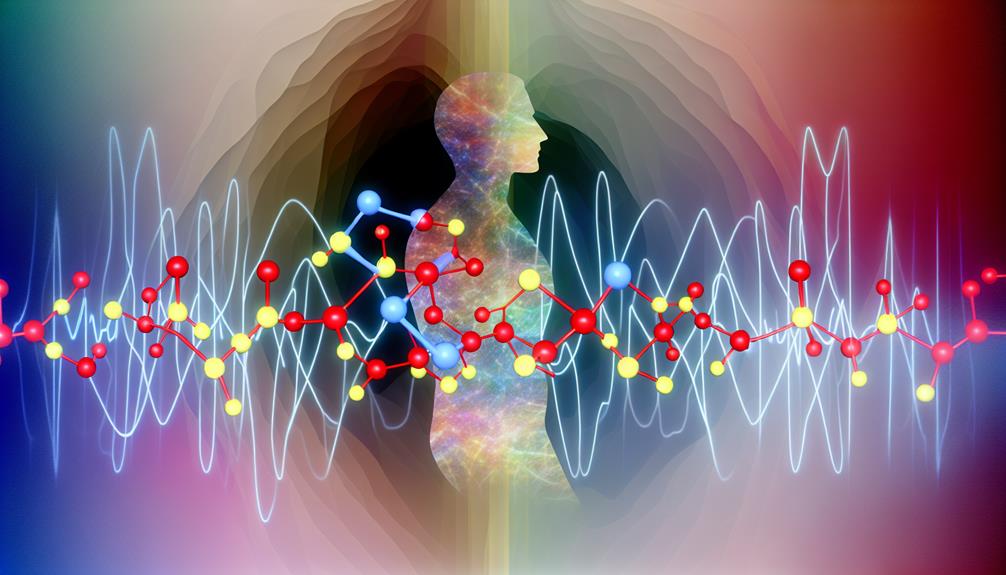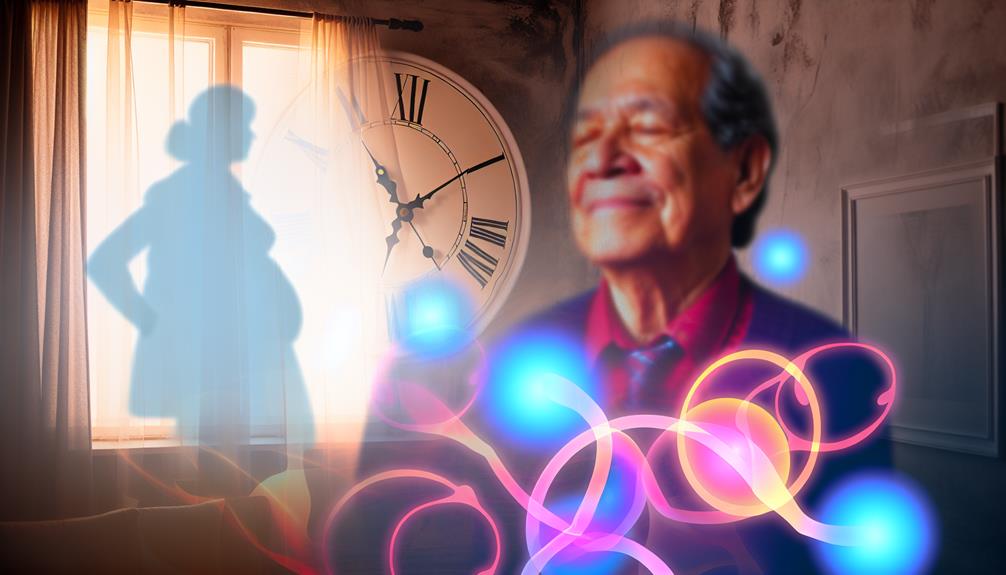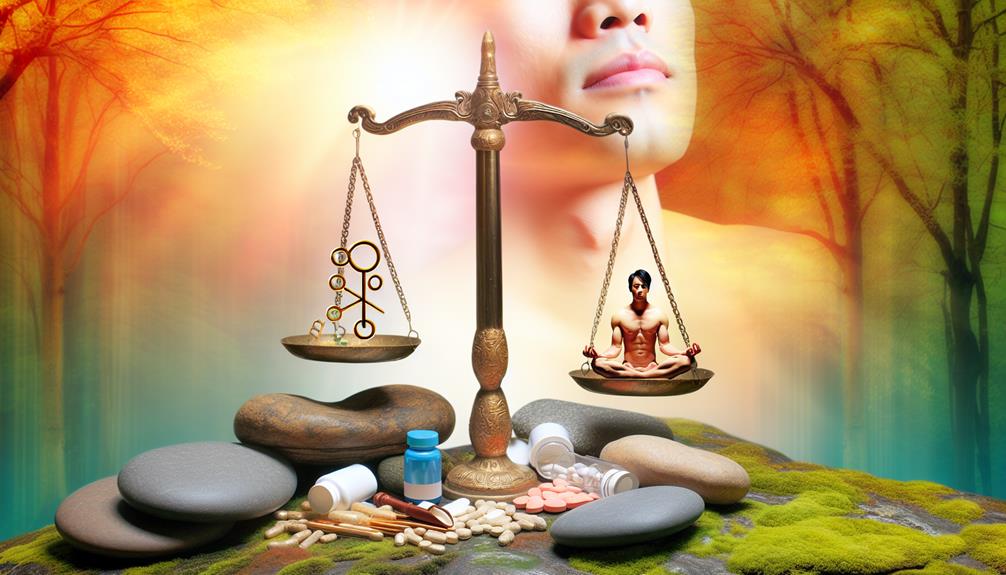Hormonal fluctuations have a profound impact on male libido. I've found that testosterone is essential for sexual desire; low levels often lead to diminished interest and performance. Elevated estrogen can also disrupt testosterone balance, further affecting libido. Additionally, high cortisol from stress suppresses testosterone, prioritizing survival over sexual function. As men age, testosterone typically declines while estrogen may rise, contributing to decreased sexual desire. Addressing lifestyle factors like diet, exercise, and stress management can help maintain hormonal balance. Understanding these dynamics can empower men to tackle libido issues effectively, revealing more strategies to enhance sexual health.
Understanding Hormones and Libido

Hormones play an essential role in regulating male libido, acting as the biological underpinnings of sexual desire. Among these hormones, testosterone production is paramount. This key androgen is often associated with increased libido; without sufficient levels, a man's sexual interest can diminish considerably. Research indicates that ideal testosterone levels are linked to enhanced sexual arousal and performance.
Interestingly, the effects of estrogen shouldn't be overlooked. While primarily considered a female hormone, men also produce estrogen, and elevated levels can lead to decreased libido. This imbalance can disrupt sexual functioning and may even contribute to mood disorders, further impacting desire.
Moreover, neurotransmitter roles are vital in this hormonal interplay. Dopamine, for example, is a neurotransmitter that enhances pleasure, and its activity is closely tied to sexual motivation. Conversely, serotonin, while also important, can inhibit sexual desire when present in excess. Therefore, the balance of these chemicals is essential for a healthy libido.
Lastly, cortisol influence cannot be ignored. Known as the stress hormone, elevated cortisol levels can lead to anxiety and fatigue, both of which can have detrimental effects on sexual desire. Chronic stress can suppress testosterone production, creating a vicious cycle that can further diminish libido.
Key Hormones Affecting Male Sexual Desire
How do specific hormones influence male sexual desire? Understanding the hormonal landscape is essential for grasping the complexities of libido in men. Several key hormones come into play, each affecting sexual desire in distinct ways. Here's a breakdown:
- Testosterone Balance: Often dubbed the primary male sex hormone, testosterone directly influences libido. Low levels can lead to decreased sexual desire, while balanced levels support a healthy sex drive.
- Estrogen Influence: Though mainly associated with females, estrogen also plays a role in males. Elevated estrogen levels can negatively impact testosterone balance, leading to reduced libido and sexual function.
- Cortisol Effects: Cortisol, the stress hormone, can greatly dampen libido when chronically elevated. Its presence often signals the body to prioritize survival over sexual functions, leading to diminished sexual desire.
- Thyroid Function: The thyroid gland regulates metabolism and energy levels, which can indirectly influence libido. Hypothyroidism can result in fatigue and low motivation, affecting sexual interest.
In addition to these hormones, dopamine plays an essential role as a neurotransmitter that enhances pleasure and reward. Higher dopamine levels can amplify sexual desire and arousal, while lower levels may lead to diminished interest in sexual activities.
Age-Related Hormonal Changes

As men age, the interplay of hormonal changes can greatly impact sexual desire and overall libido. One of the most significant changes is the gradual decline in testosterone levels, which typically begins around the age of 30 and continues at a rate of about 1% per year. This testosterone decline can lead to various age-related symptoms, such as reduced energy, mood fluctuations, and diminished sexual drive, all of which can contribute to libido variations.
Interestingly, this testosterone decline often coincides with an increase in estrogen levels. While estrogen is typically considered a female hormone, men also produce it in smaller amounts. As testosterone levels decrease, the balance between these hormones shifts, sometimes leading to higher estrogen levels, which can further affect libido. This hormonal imbalance can manifest as increased body fat, mood disturbances, and decreased sexual desire.
It's important to understand that these changes don't affect all men equally. Some may experience significant libido reductions, while others may feel relatively unchanged. Factors such as genetics, lifestyle choices, and overall health play a role in how these age-related hormonal changes manifest.
Recognizing the impacts of testosterone decline and estrogen increase is essential for understanding one's own sexual health as they age. Awareness of these age-related symptoms can empower men to seek appropriate interventions, whether through lifestyle modifications or medical advice, ultimately enhancing their quality of life and sexual well-being.
Lifestyle Factors Influencing Hormonal Levels
Numerous lifestyle factors can greatly influence hormonal levels in men, ultimately affecting libido. I've found that a few key areas stand out, and understanding them can help us take control of our hormonal health. Here are four vital factors to evaluate:
- Dietary Influences: What we eat plays a significant role in hormonal balance. Diets rich in whole foods, healthy fats, and lean proteins support testosterone production, while processed foods and excessive sugar can lead to hormonal imbalances.
- Exercise Routines: Regular physical activity is essential. Studies show that both aerobic and resistance training can boost testosterone levels. However, excessive exercise without proper recovery can lead to decreased hormone levels.
- Stress Management: Chronic stress elevates cortisol, which can negatively impact testosterone. Incorporating stress-reduction techniques like mindfulness and breathing exercises can help mitigate this effect.
- Sleep Quality: Quality sleep is vital for hormone regulation. Research indicates that inadequate sleep can disrupt testosterone production, leading to lower libido and energy levels.
Additionally, I can't overlook the influence of alcohol consumption and environmental toxins. Excessive drinking can lead to hormonal disruptions, while exposure to certain chemicals can mimic or block hormones.
Strategies for Balancing Hormones

With a clear understanding of the lifestyle factors affecting hormonal levels, it becomes vital to explore effective strategies for balancing hormones. I've found that dietary adjustments can markedly influence hormone health. Incorporating more whole foods, healthy fats, and lean proteins while reducing processed sugars and refined carbs can help stabilize insulin and testosterone levels.
Stress management is another essential component. Chronic stress elevates cortisol, which can hinder testosterone production. Techniques like mindfulness meditation, deep breathing exercises, or even simple hobbies can effectively lower stress levels. I've noticed that when I prioritize these practices, my overall mood and hormonal balance improve.
Implementing regular exercise routines is equally important. Resistance training and high-intensity interval training (HIIT) have been shown to boost testosterone levels. I've seen firsthand how consistent workouts not only enhance physical fitness but also improve my energy and mood.
Sleep quality cannot be overlooked. Poor sleep can disrupt hormonal patterns, so I focus on creating a restful environment and maintaining a consistent sleep schedule. Prioritizing seven to nine hours of quality sleep each night has made a noticeable difference in my well-being.
Lastly, I occasionally consider herbal supplements like ashwagandha or fenugreek, which have shown promise in supporting hormonal balance. However, it's essential to consult healthcare professionals before starting any new supplements.
In some cases, medical interventions may be necessary. If lifestyle modifications aren't yielding results, seeking advice from a doctor can help identify underlying issues and appropriate treatments.
Frequently Asked Questions
Can Medications Affect Male Libido Through Hormonal Changes?
Absolutely, medications can greatly affect male libido through hormonal changes. I've seen how certain drugs can lead to hormonal imbalances, which in turn may reduce sexual desire. For instance, antidepressants and blood pressure medications are known to have such side effects. It's essential to consult a healthcare professional if you're experiencing changes in libido after starting a new medication, as they can help adjust your treatment to mitigate these effects.
How Do Stress Levels Influence Hormonal Balance and Libido?
Isn't it fascinating how stress levels can dictate our hormonal balance? When I experience heightened stress, my body triggers a stress response that elevates cortisol levels. This hormone, while essential in small doses, can adversely affect my libido when chronically elevated. Studies show that sustained high cortisol can disrupt testosterone production, leading to a diminished sex drive. So, managing stress is vital for maintaining a healthy hormonal equilibrium and, ultimately, my libido.
Are There Natural Supplements That Help Improve Libido?
I've found that certain herbal remedies, like maca root and ginseng, can effectively boost libido. Dietary adjustments, such as incorporating zinc-rich foods or omega-3 fatty acids, also play a significant role. Research suggests that these natural supplements can enhance hormonal balance and improve sexual health. However, it's essential to consult with a healthcare professional before starting any new supplement regimen to guarantee it's safe and appropriate for your individual needs.
What Role Does Sleep Play in Hormonal Health and Libido?
Sleep plays an essential role in hormonal health and libido. I've noticed that improving my sleep quality and extending my sleep duration positively impacts my overall well-being. Research shows that poor sleep can lead to hormonal imbalances, which might decrease libido. By prioritizing restful sleep, I find that I feel more energetic and have a healthier desire. Overall, ensuring I get enough quality sleep is important for maintaining hormonal balance and sexual health.
How Can Relationship Dynamics Impact Male Sexual Desire?
I've noticed that relationship dynamics can really shape male sexual desire. For instance, when communication styles are open and honest, I feel more connected. This emotional intimacy fosters a safe environment for expressing needs and desires. On the flip side, poor communication can create distance, making intimacy challenging. Research shows that positive interactions can boost libido, while unresolved conflicts might dampen it. It's fascinating how our connections directly influence our sexual well-being.
